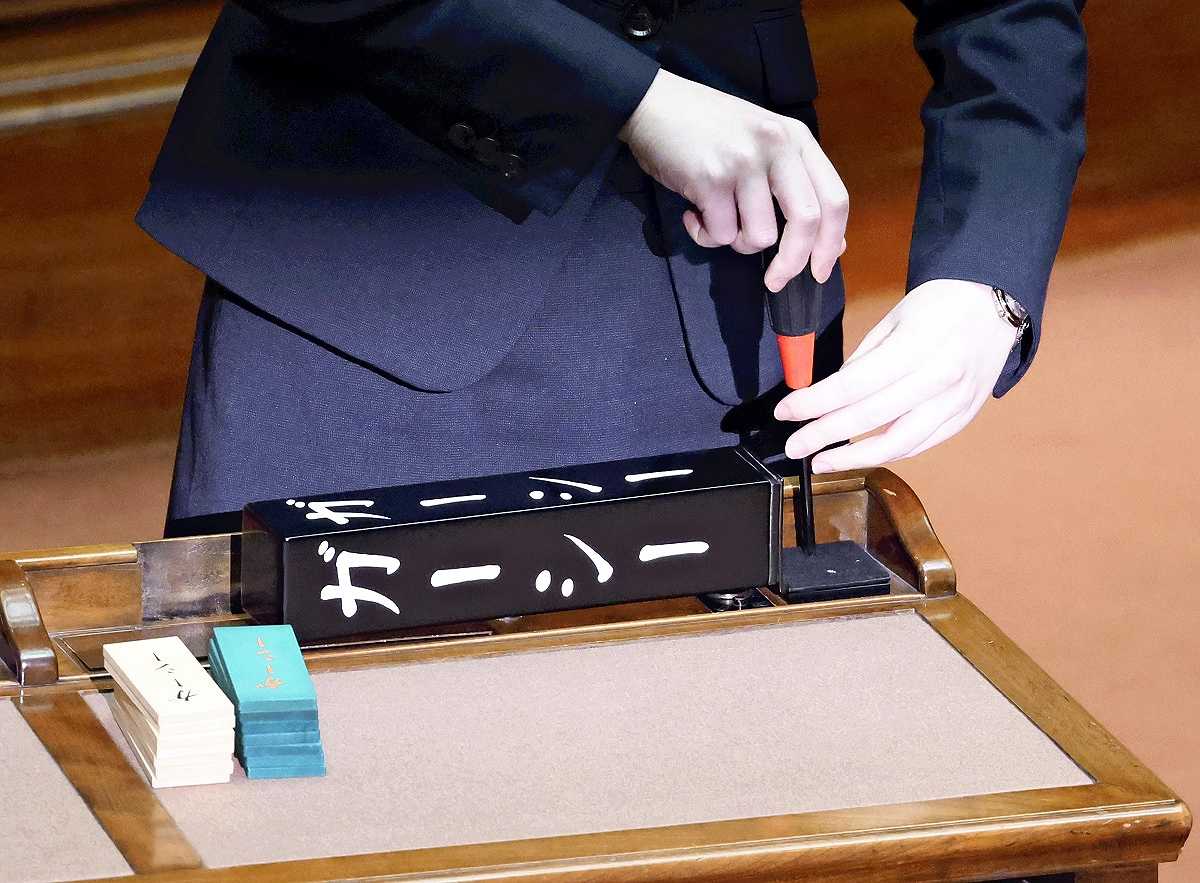
After the House of Councillors voted to expel Yoshikazu Higashitani, who goes by GaaSyy, his name is removed from a seat in the chamber on Wednesday.
18:23 JST, March 16, 2023
The expulsion from the House of Councillors of lawmaker Yoshikazu Higashitani, who goes by GaaSyy, for the extraordinary reason of failing to fulfill his duties as a Diet member, as he never attended a Diet session, has given voters and political parties plenty to consider.
By a vote of 235-1 in favor of expelling Higashitani of the Seijika Joshi 48 Party, previously known as the NHK Party.
“In accordance with the provisions of Clause 4 of Article 122 of the Diet Law, Mr. GaaSyy is expelled,” upper house President Hidehisa Otsuji declared Wednesday after the vote.
Fellow party member Satoshi Hamada had spoken on Higashitani’s behalf before the vote, arguing that the penalty of expulsion because of absence from the Diet was “illegal.”
Higashitani has stayed overseas ever since he was elected in July, claiming he would not return to Japan because of concerns he could be “unjustly detained.”
On Thursday, the Metropolitan Police Department sought an arrest warrant for Higashitani on suspicion of violating the Law on Punishment of Physical Violence and Others for threatening and defamatory remarks against celebrities and other people in his YouTube videos.
Hamada also read out Higashitani’s position during a meeting on Tuesday of the chamber’s Committee on Discipline insisting he had pledged during the election campaign that he would not attend Diet sessions.
Higashitani became the first Diet member to be expelled since 1951 and the third under the current Constitution. He is the first to be expelled for being absent from the Diet.
Information sources
Higashitani rose to prominence through a YouTube channel launched under the name GaaSyy in February 2022. While being based in Dubai in the United Arab Emirates and elsewhere, the channel ran videos about celebrity scandals and other issues he apparently found out about through sources including his connections in the entertainment industry.
His channel topped 1 million subscribers in about two months. Higashitani’s use of social media platforms such as Twitter and Instagram helped him shoot to fame as a YouTuber who specializes in exposing the dark sides of celebrities.
In May 2022, Higashitani announced that he was running in the upper house election and lobbed criticism at Diet members who dozed off during deliberations. He said he wanted to slap these politicians on the head and tell them remove their Diet member lapel pins, boasting of his intention to expose the skeletons hiding in their closets.
During the election campaign period, he remained overseas and used social media to urge people to vote for him. His approach appealed to some voters frustrated with the established political parties and he won a seat through the proportional representation segment by garnering about 288,000 votes.
His rise to become a lawmaker has exposed a negative effect of this age when many people rely heavily on the internet for information not necessarily based on facts. Extreme comments and actions also tend to get lionized.
“The internet-dependent society’s influence is growing,” said International University of Japan Associate Prof. Shinichi Yamaguchi, an expert in online media. “I think there will be more cases in which people who gain support by making extreme remarks online will enter politics.”
On Feb. 22, the upper chamber decided to punish Higashitani for his continued absence, ordering him to make an apology in the Diet. Higashitani conveyed his intention to comply with this demand, but he was absent from the March 8 upper house plenary session at which he was due to give his apology.
“This has ended up being a test of voters’ political literacy,” said Hosei University Prof. Hiroshi Shiratori, an expert in the analysis of contemporary politics. “It demonstrated that voters must carefully examine the statements made by political parties and candidates before casting their vote.”
Electoral system in spotlight
The Higashitani saga also has cast a shadow over the upper house electoral system. Political parties submit a list of candidates running in the proportional representation segment and the seats are allocated to the candidates on a list who gain the most votes. GaaSyy’s party knew he would not return to Japan but still nominated him in the hopes of benefiting from his ability to attract voters.
In January, minor opposition party Reiwa Shinsengumi stirred controversy by announcing a plan under which the five years remaining in the six-year term of a party member who was elected to the upper house in the proportional representation section of last year’s election but who later had to resign due to poor health would be filled in one-year turns by Reiwa Shinsengumi members through a “rotation system.”
“This could raise serious questions about the upper chamber’s electoral system itself,” Shiratori said. “Political parties’ judgment is being put to the test.”
Top Articles in Politics
-

Japan PM Takaichi’s Cabinet Resigns en Masse
-

Sanae Takaichi Elected Prime Minister of Japan; Keeps All Cabinet Appointees from Previous Term
-

Japan’s Govt to Submit Road Map for Growth Strategy in March, PM Takaichi to Announce in Upcoming Policy Speech
-

LDP Wins Historic Landslide Victory
-

LDP Wins Landslide Victory, Secures Single-party Majority; Ruling Coalition with JIP Poised to Secure Over 300 seats (UPDATE 1)
JN ACCESS RANKING
-

Producer Behind Pop Group XG Arrested for Cocaine Possession
-

Japan PM Takaichi’s Cabinet Resigns en Masse
-

Japan Institute to Use Domestic Commercial Optical Lattice Clock to Set Japan Standard Time
-

Man Infected with Measles Reportedly Dined at Restaurant in Tokyo Station
-

Israeli Ambassador to Japan Speaks about Japan’s Role in the Reconstruction of Gaza





















